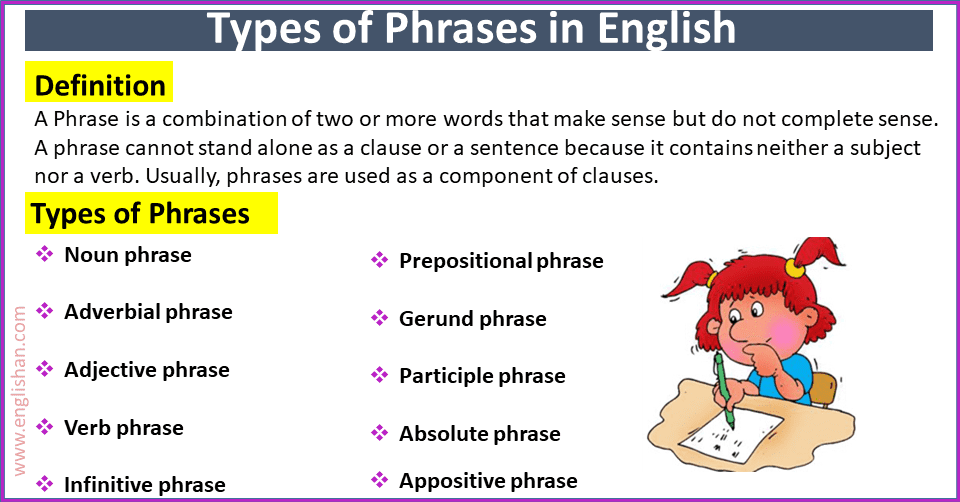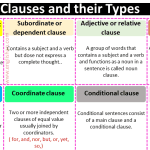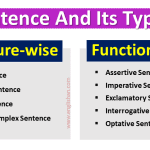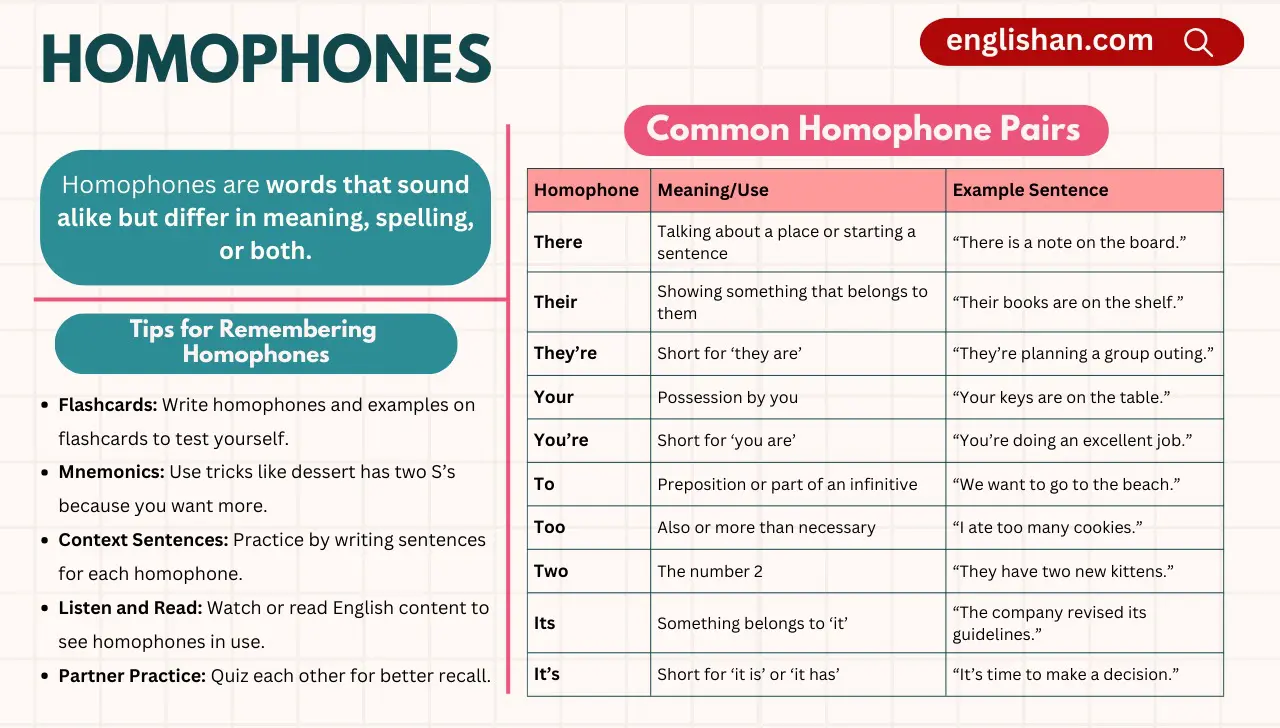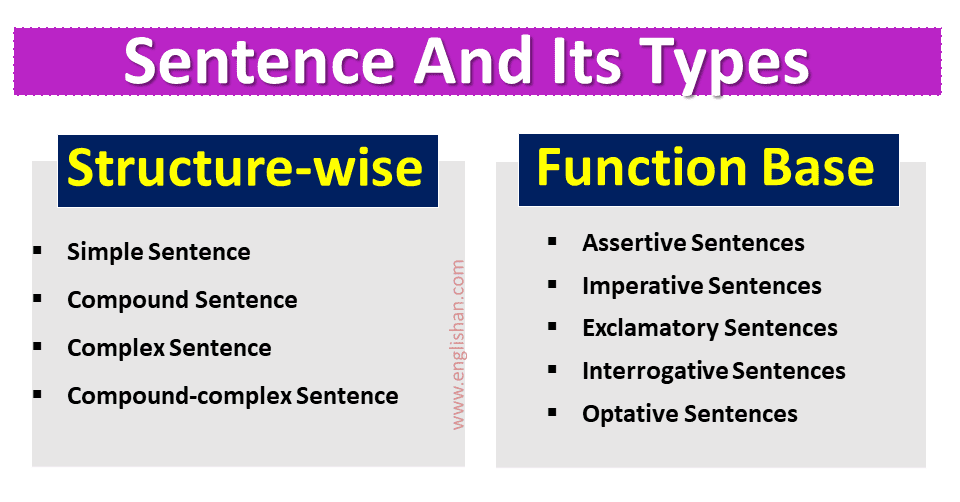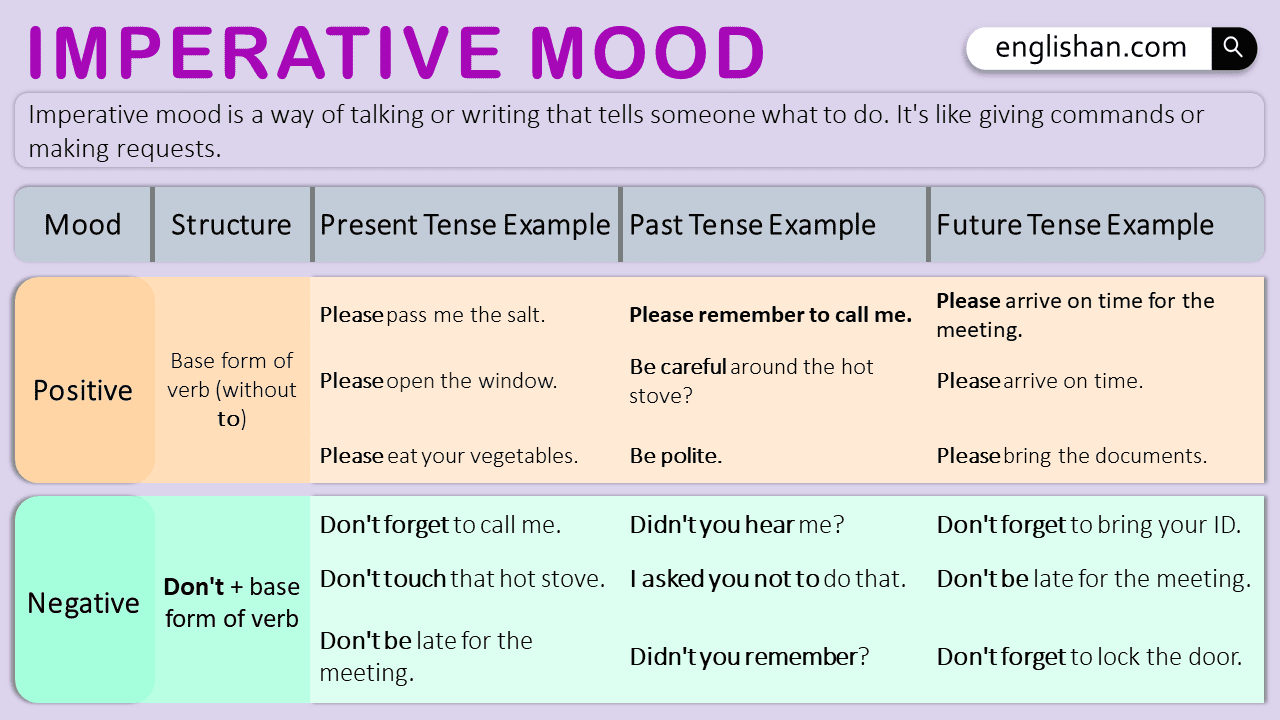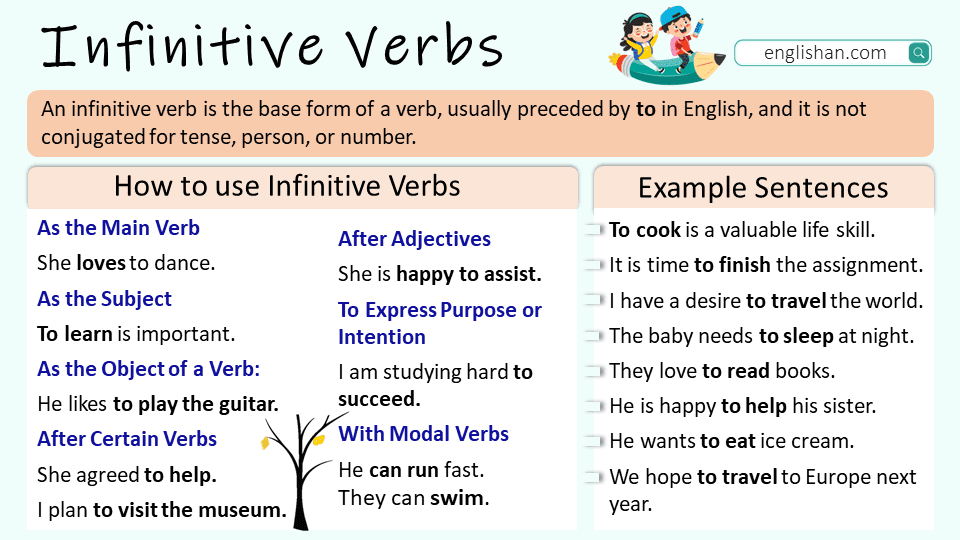A phrase is a group of words that works as a single unit in a sentence but cannot stand alone as a complete sentence. It doesn’t have both a subject and a verb, so it cannot express a complete thought by itself. Instead, phrases work inside clauses to give more meaning to the sentence.
You can find more than one phrase in a sentence. When one phrase is placed inside another, it’s called a nesting phrase.
Examples:
- He told me a sad story.
- I like writing short stories.
- After a few minutes, I’ll meet you in the cafeteria.
Phrases can act like nouns, adjectives, adverbs, verbs, or prepositions in a sentence. Based on their role, there are different types of phrases, such as:
Types of phrases
- Noun phrase
- Adverbial phrase
- Adjective phrase
- Verb phrase
- Infinitive phrase
- Prepositional phrase
- Gerund phrase
- Participle phrase
- Absolute phrase
- Appositive phrase
Noun phrase
A noun phrase is a group of words that works as a noun in a sentence. It includes a noun and other words that describe or limit it, such as modifiers or determiners. It can act as the subject, object, or complement in a sentence.
For example,
- We enjoy playing cricket.
- He wants to pass the exam.
- The teacher is coming to the classroom.
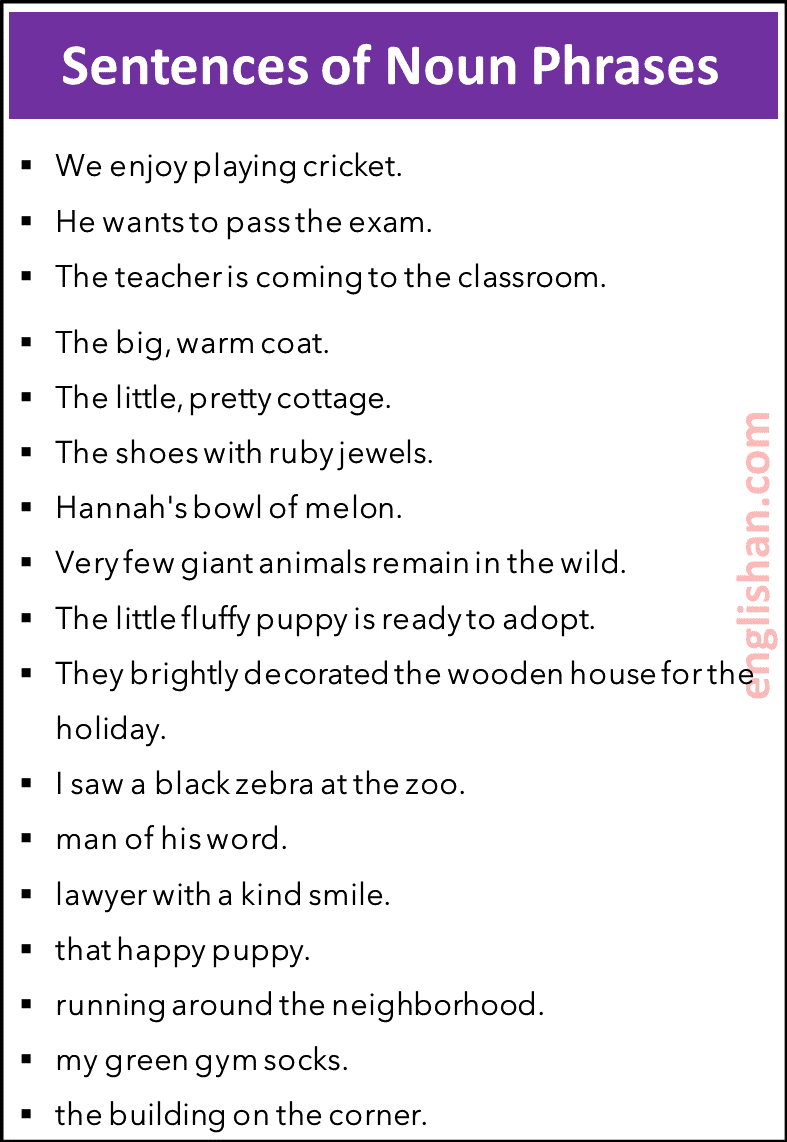
Adverbial phrase
A group of words that function as an adverb in a sentence to modify a verb, adjective, or another adverb. An adverbial phrase gives us more information about the verb or a sentence by answering questions like how, when, why, and where an action takes place.
For example,
- I will do it in a minute. (when)
- He answered in a very rude manner. (how)
- The cat is hiding under the table.
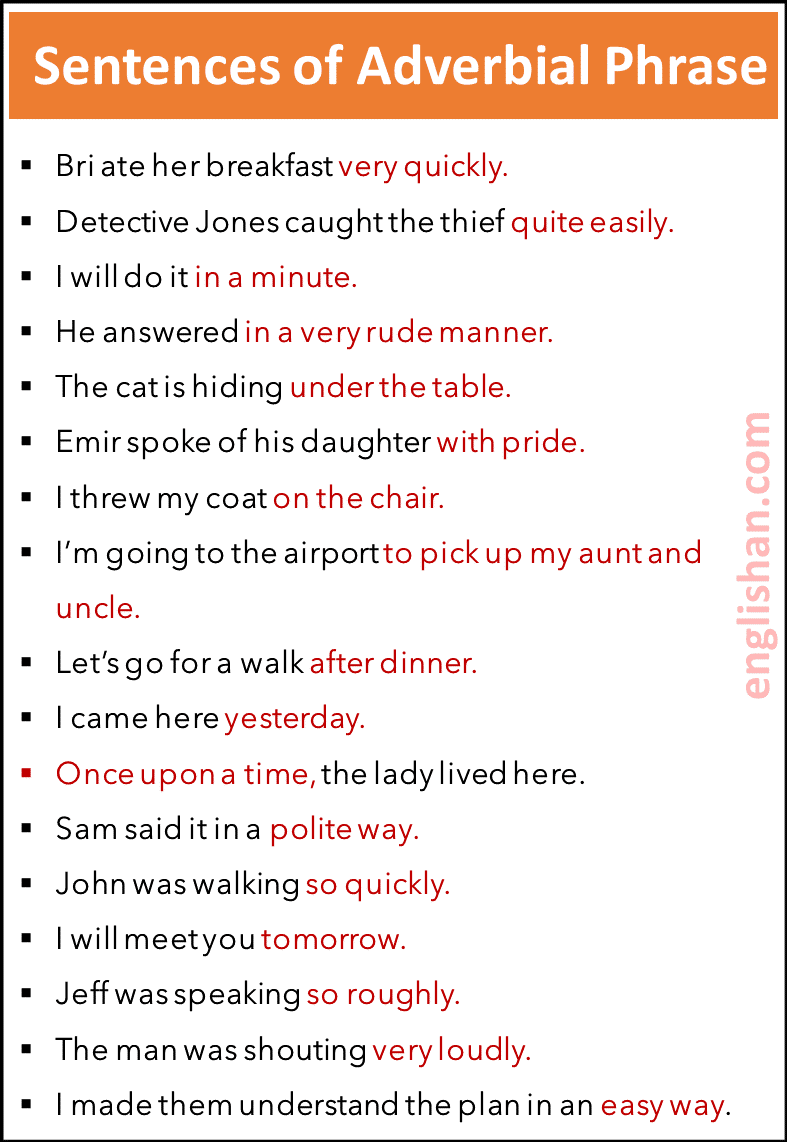
Adjective phrase
A group of words that functions as an adjective in a sentence. It gives us more information about a noun or a pronoun. An adjective phrase consists of adjectives, modifiers, and other words modifying a noun or a pronoun.
For example,
Life is not a bed of roses.
She is an extremely intelligent girl.
A student from my college won the race.
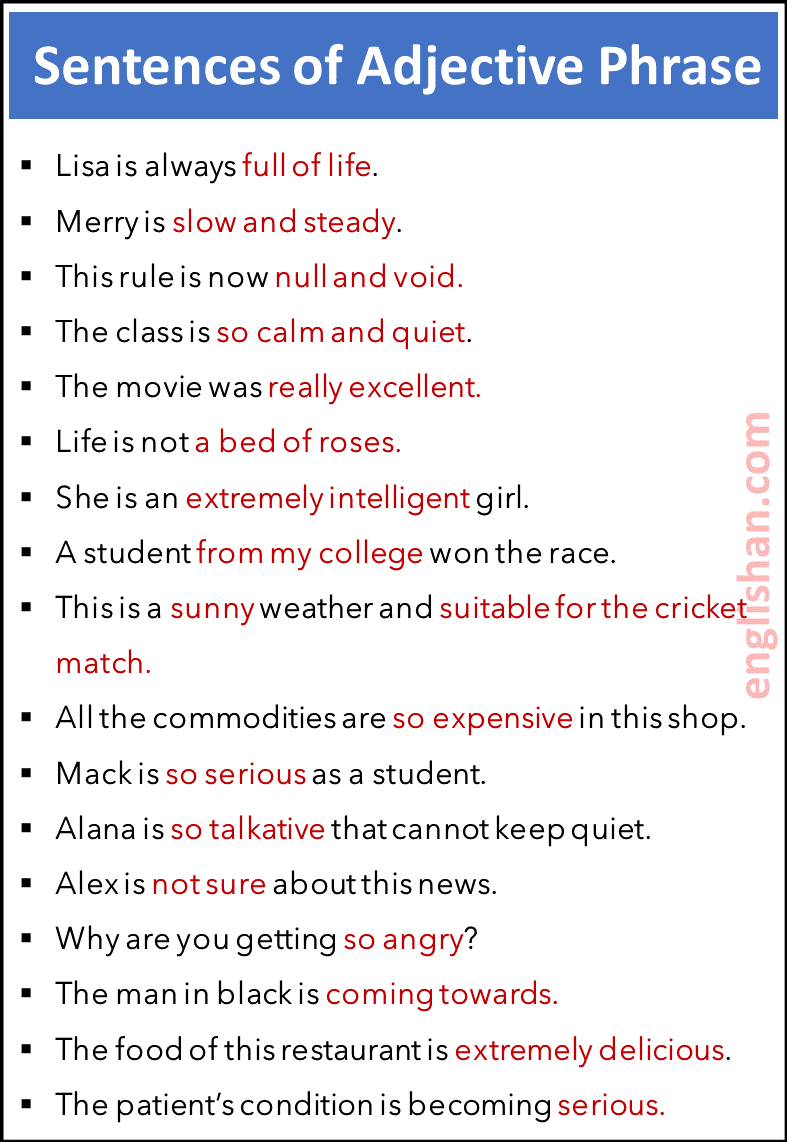
Verb phrase
A verb phrase is made up of a main verb and one or more helping verbs (also called auxiliary or modal verbs). It works as the action part of the sentence and plays the role of a verb.
For example,
- Beautiful flowers are blooming.
- She will go to the party.
- The students must reach on time for the class.
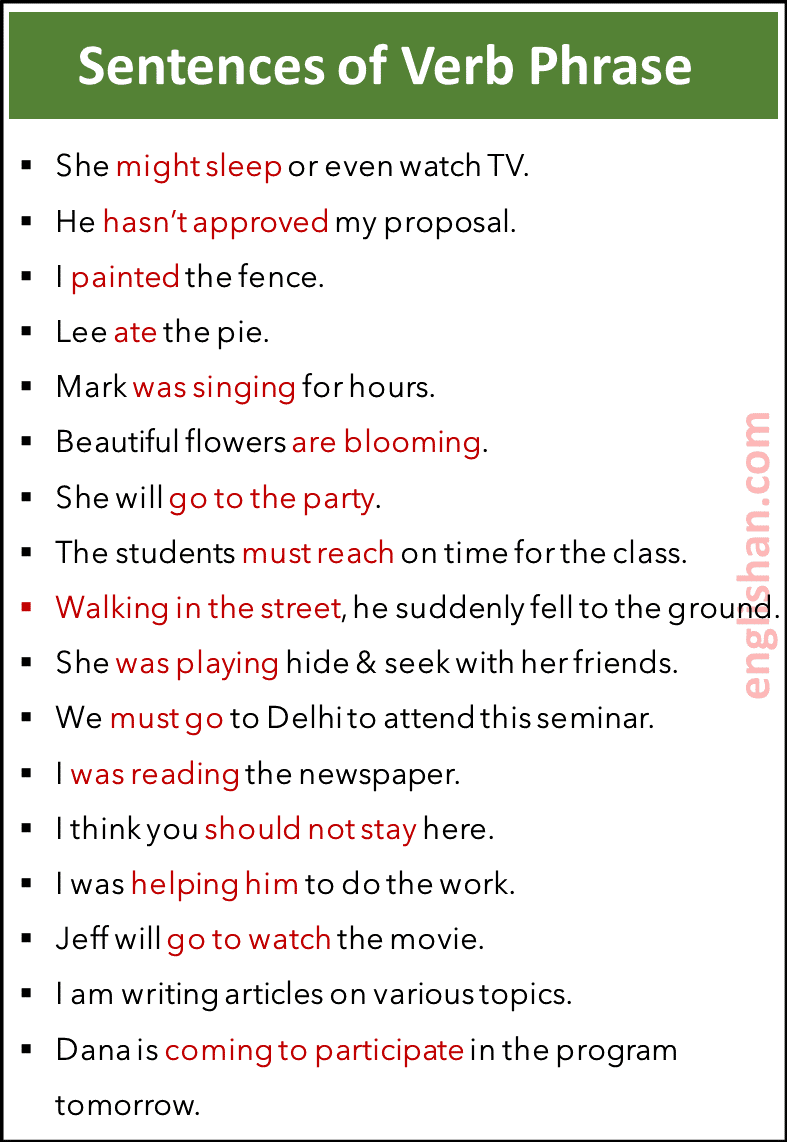
Infinitive phrase
An infinitive phrase starts with “to” followed by the base form of a verb (like to eat, to play, to read). It may also include modifiers or other words connected to the verb. This phrase can function as a noun, adjective, or adverb in a sentence.
For example,
- I like to see a smiling face.
- He wants to explore a new world.
- Pakistan cricket team is trying to win the match.
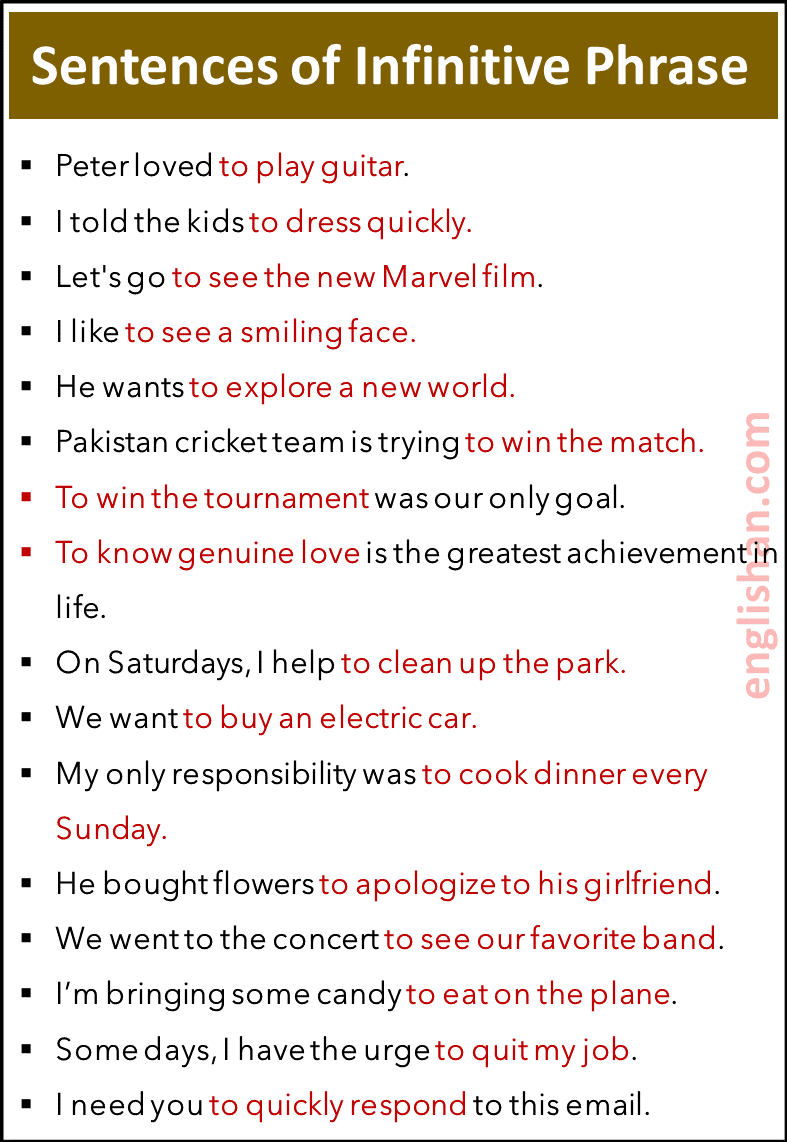
Prepositional phrase
A prepositional phrase is a group of words that begins with a proposition and includes the object of the preposition ( noun, pronoun, or other modifiers). The prepositional phrase functions either as an adjective or adverb in a sentence.
For example,
- The earth rotates on its axis.
- He lives in a small village.
- She is sleeping on the couch.
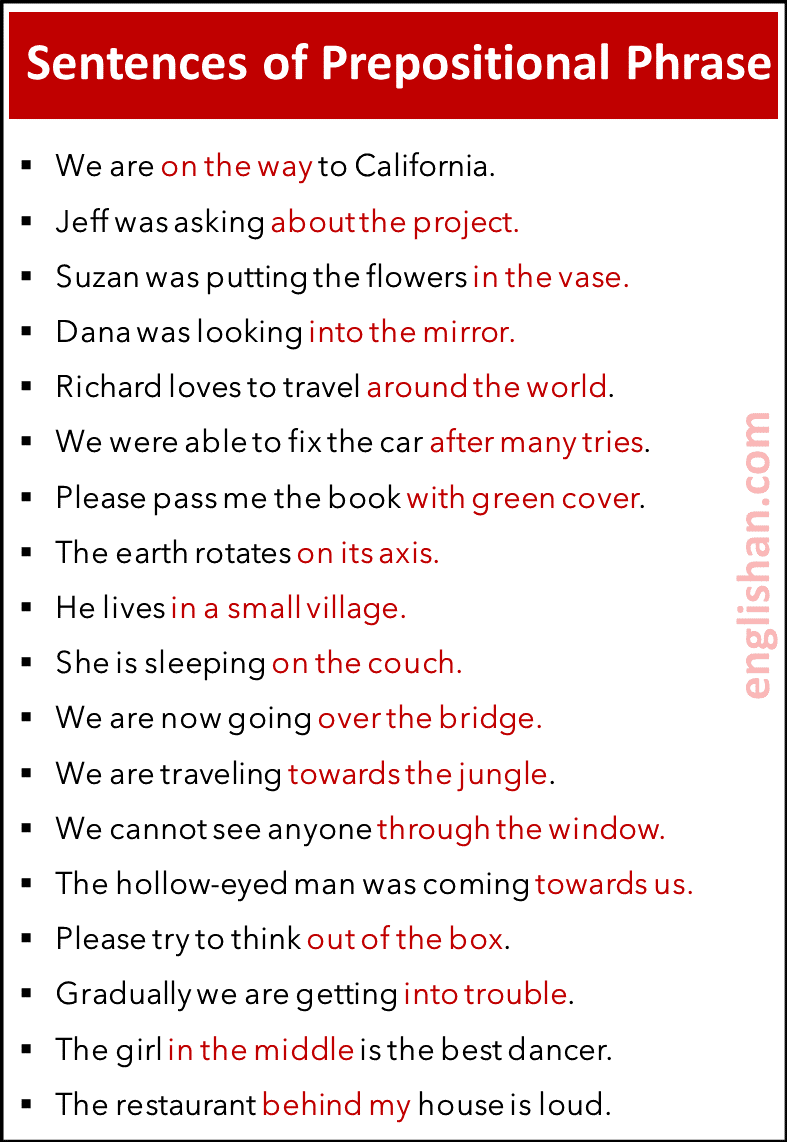
Gerund phrase
A gerund is the -ing form of a verb that works as a noun in a sentence. A gerund phrase includes the gerund, along with its object and any modifiers. It can be used as the subject or object of a sentence.
For example,
- I love writing comic books.
- He was accused of smuggling.
- They are thinking of emigrating.
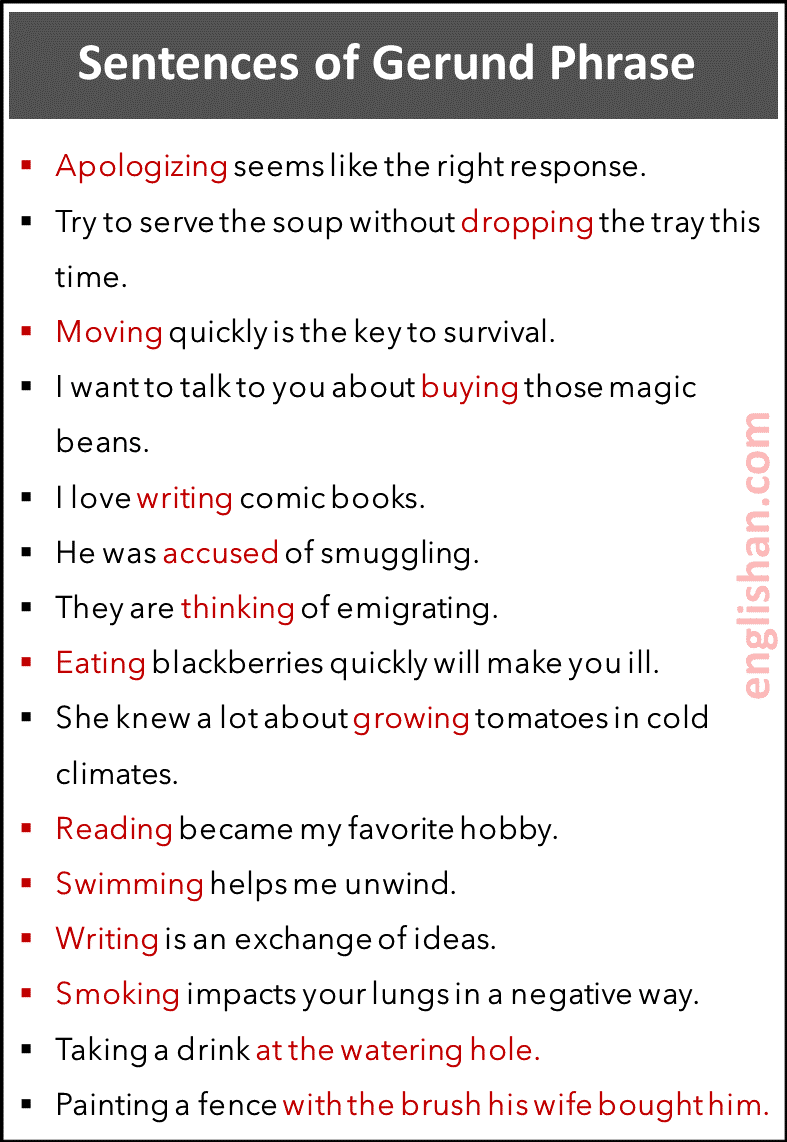
Participle phrase
A participle phrase consists of a present participle (verb + ing) or a past participle (2nd form of the verb) and often includes an object or modifier to complete the thought. It functions as an adjective and is separated by commas. For example,
- The table, made of steel, is very pricey.
- The girl, standing next to the bus is my sister.
- I received a mail, mentioning my exam.
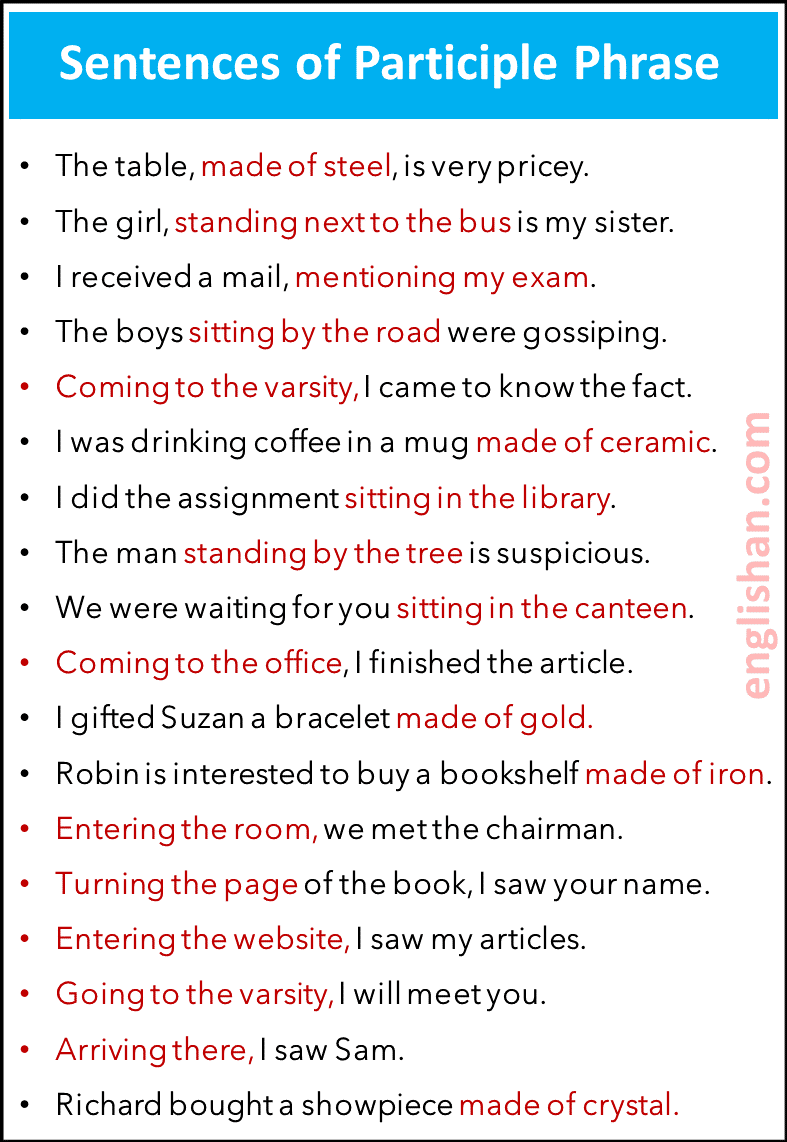
Absolute phrase
An absolute phrase, also known as a nominative phrase, includes a noun or pronoun, a participle, and other modifiers. It adds extra information about the whole sentence, not just one part of it. Unlike a clause, it does not have a finite verb. This phrase often stands alone with its own subject and is usually set off by a comma.
For example,
- He, having an injury in his leg, won the race.
- Their eyes follow, the hook of the ball.
- Weather permitting, the meeting will be held tomorrow.
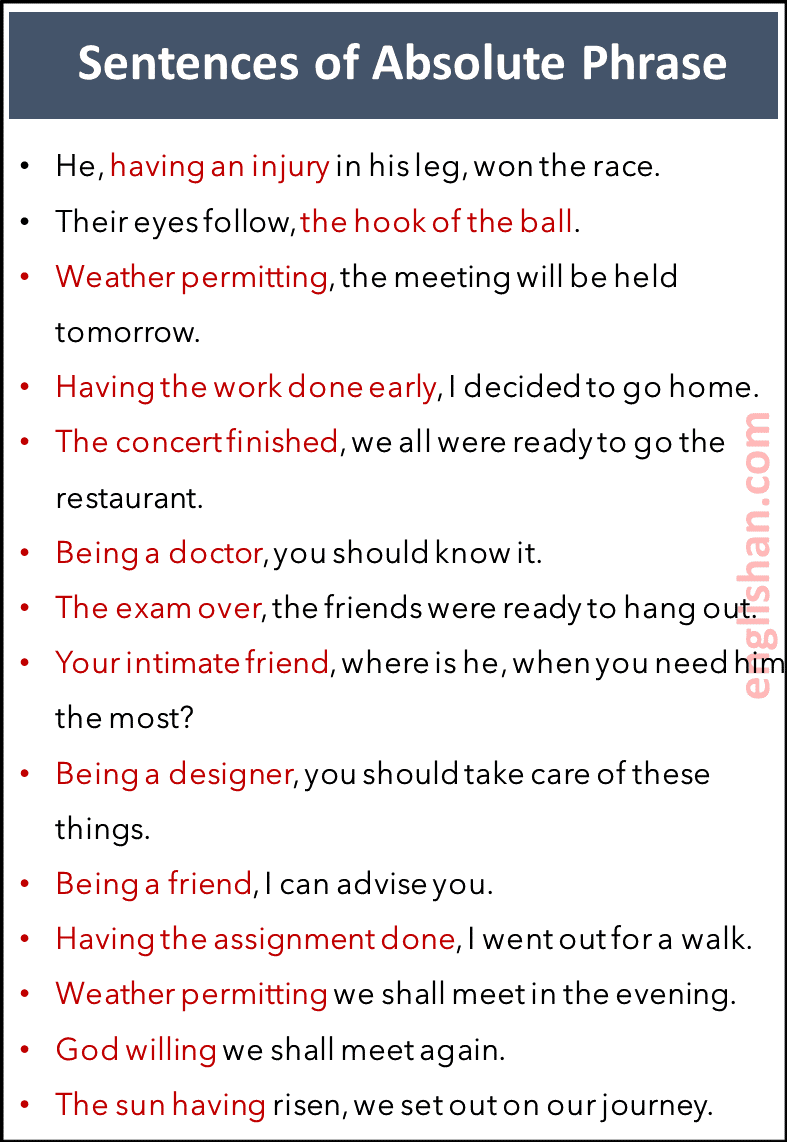
Appositive phrase
When we combine two sentences with the help of defining clause, it becomes a phrase in apposition. And these phrases are mostly used in the middle or at the end of a sentence.
For example,
- Karachi, the first capital of Pakistan, is the most populated city in Pakistan.
- Ali, my best friend, is very hardworking.
- The magistrate, the agha khan, was a kind man.
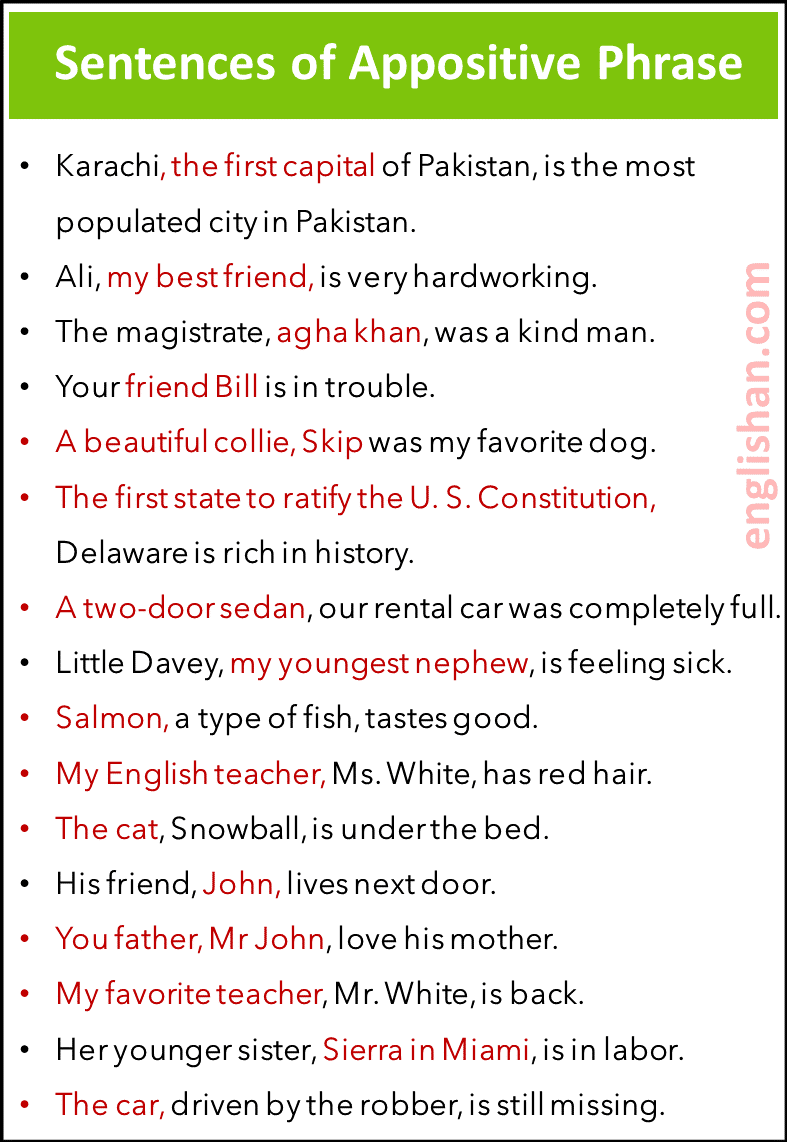
FAQs:
Here are the 5 types of phrases:
1. Noun Phrase – A group of words acting like a noun.
Example: The big dog.
2. Verb Phrase – A group of words acting like a verb.
Example: Has been working.
3. Adjective Phrase – A group of words that describe a noun.
Example: The book on the table.
4. Adverb Phrase – A group of words that describe a verb, adjective, or adverb.
Example: She sings very loudly.
5. Prepositional Phrase – A group of words starting with a preposition.
Example: The cat is under the bed.
Here are the 7 types of phrases:
1. Noun Phrase – Acts like a noun. The tall tree swayed.
2. Verb Phrase – Acts like a verb. She has been reading.
3. Adjective Phrase – Describes a noun. The dog with the red collar.
4. Adverb Phrase – Describes a verb, adjective, or adverb. He ran very quickly.
5. Prepositional Phrase – Starts with a preposition. The book is on the table.
6. Infinitive Phrase – Starts with “to” + verb. I want to eat pizza.
7. Gerund Phrase – A verb + ing acting as a noun. Running in the morning is fun.
Here are 12 examples of phrases:
1. The tall tree
2. Is running fast
3. With the blue door
4. Very clearly
5. Under the table
6. To play soccer
7. Swimming in the pool
8. Running fast
9. A talented musician
10. Ate the pizza
11. On the shelf
12. With great speed
The difference between idioms and phrases:
Idioms are expressions where the meaning is not literal.
Example: “Piece of cake” means something is easy.
Phrases are groups of words with a literal meaning.
Example: “On the table” means something is physically on top of the table.
You May Also Like
